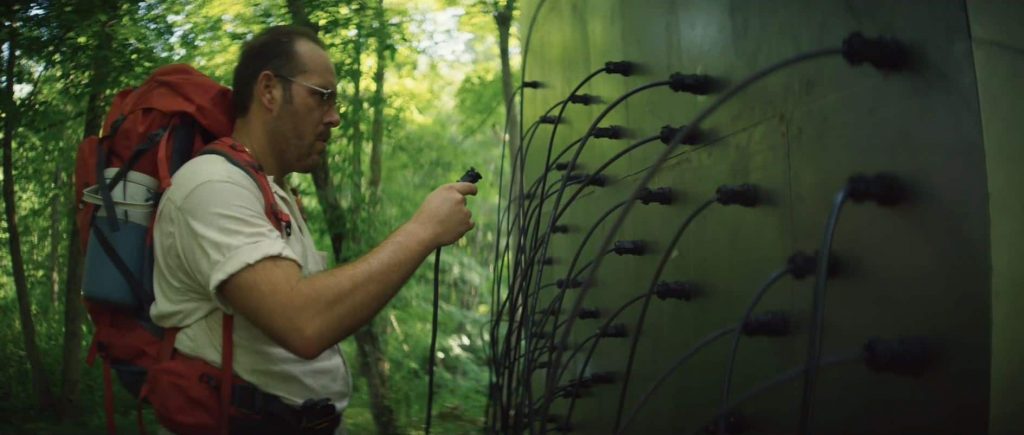Lapsis – Film Review
Reviewed by Damien Straker on the 31st of May 2021
Maslow Entertainment presents a film by Noah Hutton
Produced by Taylor Hess and Jesse Miller
Written by Noah Hutton
Starring: Dean Imperial, Madeline Wise, and Babe Howard
Music by Noah Hutton
Cinematography by Mike Gomes
Editing by Noah Hutton
Rating: PG
Running Time: 108 minutes
Release Date: the 3rd of June 2021
Most of Lapsis engages because the execution of its sci-fi themes starkly differs from other films probing today’s technology. The film is not a brilliant example of filmmaking, and it does not create an elaborate canvas to stage incredible visuals. Instead, its subdued humour and low-budget stylistic choices prove integral to its quirky and (very) strange intentions. A more sophisticated degree of filmmaking would be unbecoming for dramatising technology’s grip on the past and present world.
The aim of Lapsis’ sci-fi themes is to critique the treatment of modern gig economy workers. Noah Hutton, previously a documentary filmmaker, draws deliberate parallels to tech companies such as Uber, Amazon, and Airtasker. Collectively, these are companies where people are hired as individual contractors to perform a service. The film satirises how poorly they treat these workers and create deep class divisions. Hutton’s ambitions, using science fiction to probe unregulated capitalism, is an attractive quality. It is unfortunate though that Lapsis’ final quarter fails to close the story without muddling the character relations. Still, it is mysterious enough to warrant another viewing to clarify its story points.
It is important to underline the difficulty of making a film like this in today’s climate. It is increasingly hard for mainstream filmmakers to have new, exciting ideas funded because of the risk-averse nature of mainstream filmmaking. Hollywood films are homogenised and simplified since executives falsely believe that anything sharper will deter audiences. It was a wise decision then for Hutton to make Lapsis independently. He wrote, directed, and scored the film. The budget was so meagre he borrowed robots from a real research lab to save money. He also said he was lucky it did not rain during filming because he could not afford wet weather when using robots and would need a suitable backup plan.
The story Hutton has written is a mystery and partly expressed through deadpan humour satirising corporatism. In his feature debut role, Dean Imperial stars as Ray. He is a New York delivery man who is caring for his sick brother, Jamie (Babe Howard). To pay for Jamie’s healthcare in an expensive clinic, Ray is coaxed into undertaking a paid gig with a tech company called ‘CBLR’. It hires people with the right permit and calls them ‘Cablers’. Cablers travel through a large forest area and pull cables along a designated path to build a computer network. They also compete against little robots for work.
Ray asks the other workers about using the elaborate computer systems. He does not entirely understand what exactly CBLR wants to achieve. It simply involves plugging the cables into a giant cube structure at the end of the path to build the network. A troubling facet is how the other workers have their own digital identities. Yet Ray’s pseudonym, ‘Lapsis Beeftech’, is already programmed into the phone he has received. When people hear his username, they are abrasive towards him. It leads him to ask who Lapsis Beeftech was. One person, Anna (Madeline Wise), questions his privileges in the current gig economy. She is somehow connected to this pseudonym and a video left on Ray’s phone.
Lapsis’ story is buoyed by parallels to the gig economy and the depth of its central mystery. One example is how the film deliberately mirrors the ambiguity of the modern gig economy’s intentions. For example, the workers are forced to undertake tough physical routes through the forest, but the company’s endgame is unclear. Polite assurances by young representatives and cheesy info videos about quantum computers are unhelpful. Resisting explanations cleverly ensures Lapsis is not overwhelmed by pseudo-scientific jargon. Instead, the confusion mirrors Ray’s dislocation from a modern society that preferences automation over human labour.
At one point, Anna jokingly says he resembles a 1970s gangster, but ultimately, he remains someone surrounded by strange modern tech, including airborne robots dropping equipment. Other aspects are suitably retro, especially the computer graphics resembling tech from several decades ago. The forest setting and lack of understanding expresses Ray’s disorientation as a man caught between two contrasting time periods. It also humorously reminds us of improbable business plans tech companies offer, such as Uber casually predicting it will one day ferry people to work using helicopters.
Lapsis continues its pursuit of displacement through a noir-like mystery about mistaken identity. People’s weariness upon hearing Ray’s username and his failure to understand who owned his phone compares to a case of mistaken identity. He also uncovers a huge sum of credits at his disposal without knowing what to do with it. The money aggrieves the other workers undertaking low paying tasks. This plot point recalls the film noir McGuffin device of the bag or briefcase of money. It also continues mirroring the modern gig economy. Due to his mysterious name, new job routes open on Ray’s phone that offer him greater rewards than anyone else. It resembles a real-life reputation system that allows contractors to earn business over rival workers. Through its mystery, Lapsis probes the ‘haves and have nots’ and how unregulated capitalism creates fierce competition between gig workers.
Questions over Ray’s allegiance reflects a broader dilemma about people valuing machines more than humans. Evidently, Lapsis Beeftech is highly detested, leaving Anna to probe whether Ray sides with the workers or the corporation supposedly helping Jamie recover. There is also a chilling moment where someone tries cutting corners on their route and is glimpsed being taken away on the back of a truck by CBLR. The film’s central dilemma is then reflected in a crucial scene where Ray is dismissed by a family when he wants to charge his tools in their garage. Other gig workers are previously shown freely entering people’s homes. Soon, a robot enters the garage without resistance from the family. The moment underlines their tolerance of machines over people. The slightly chilling image mirrors real Amazon workers being permitted to freely enter people’s homes. These parallels infer a universal truth in the story that people prefer the ominous nature of technology over other humans.
It is a pity that Lapsis stumbles in its last quarter, particularly when Ray attempts to remove his brother from the clinic. The way the film paints a target on the American healthcare system is highly agreeable. However, the escape from the clinic and the more mysterious relationships between the characters are rushed and unclear. It would be helpful to revisit the film to develop a greater understanding of the more subtle points. An upside is that after seeing the film, I have tried piecing together its finer details. While some of the motives are ambiguous, it is preferable to a film that dissolves before the credits roll.
Lapsis is tricky to review because its quirky presentation is at once alienating and unique. Rather than simply voicing concerns about the modern gig economy, it offers glimpses into a peculiar sci-fi world that evokes deliberately uncanny images. Evidently, Noah Hutton has crafted an uneasy bind between the past and present worlds. His world building is aided by Dean Imperial’s disarmingly light comic performance, where his character fails to understand CBLR’s technical jargon. Hutton also employs enough interesting story hooks to engage us and to deter us from the budget’s limits. It is only in the last quarter that Lapsis fails to sow its complicated plot points together. It is an undeniably bizarre movie and not always successful, but its boldness remains an intriguing proposition.
Summary: It is an undeniably bizarre movie and not always successful, but its boldness remains an intriguing proposition.









